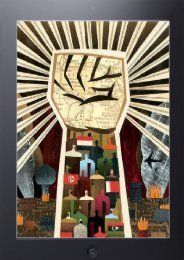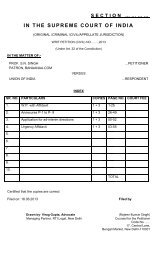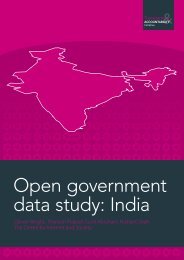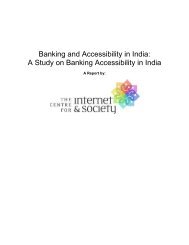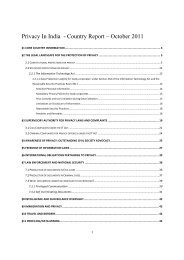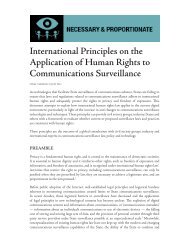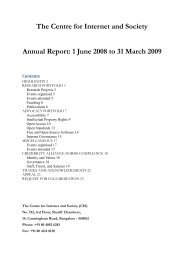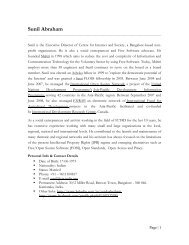Open Access to Scholarly Literature in India - Centre for Internet and ...
Open Access to Scholarly Literature in India - Centre for Internet and ...
Open Access to Scholarly Literature in India - Centre for Internet and ...
Create successful ePaper yourself
Turn your PDF publications into a flip-book with our unique Google optimized e-Paper software.
which was the home of science <strong>in</strong> pre-Independent <strong>India</strong>, does not have a s<strong>in</strong>gle OA reposi<strong>to</strong>ry,<br />
a clear <strong>in</strong>dication of a city <strong>in</strong> decl<strong>in</strong>e.<br />
A large majority of papers <strong>in</strong> the reposi<strong>to</strong>ries of IISc (EPr<strong>in</strong>ts@IISc) <strong>and</strong> the National<br />
Metallurgical Labora<strong>to</strong>ry (EPr<strong>in</strong>ts@NML) allow users the option of 'Request copy'.<br />
Scientists' views<br />
Most of the scientists discuss<strong>in</strong>g open access are from Bangalore <strong>and</strong> IISc. Also,<br />
among all <strong>India</strong>n journals it is only Current Science that frequently gives some space <strong>for</strong><br />
discussion on open access. There have been occasional edi<strong>to</strong>rials <strong>in</strong> <strong>India</strong>n Journal of<br />
Medical Research <strong>and</strong> National Medical Journal of <strong>India</strong>, <strong>and</strong> comments <strong>in</strong> a few other<br />
journals, but noth<strong>in</strong>g compared <strong>to</strong> Current Science.<br />
While there is widespread support <strong>for</strong> open access among scientists <strong>in</strong> the advanced<br />
countries, only a few <strong>India</strong>n scientists have expressed their views on open access. Here is<br />
what Prof. Balaram, Direc<strong>to</strong>r, <strong>India</strong>n Institute of Science, <strong>and</strong> a Member of the National<br />
Knowledge Commission as well as the Prime M<strong>in</strong>ister's Science Advisory Council, wrote<br />
<strong>in</strong> an edi<strong>to</strong>rial <strong>in</strong> Current Science, “The idea of open, <strong>in</strong>stitutional archives is one that<br />
must be vigorously promoted <strong>in</strong> <strong>India</strong>. The <strong>in</strong>troduction of legislation that vests copyright<br />
with <strong>in</strong>stitutions, <strong>in</strong> the case of publicly funded research, may also provide the necessary<br />
legal framework <strong>to</strong> avoid any contentious issues.” He cont<strong>in</strong>ued, “M<strong>and</strong>at<strong>in</strong>g open access<br />
<strong>for</strong> all publicly funded research publications is easy <strong>to</strong> do by legislation. It is also a requirement<br />
that can be <strong>in</strong>sisted upon by philanthropic private fund<strong>in</strong>g bodies like the<br />
Wellcome Trust <strong>and</strong> the Howard Hughes Medical Institute.” 116 In one of his <strong>in</strong>terviews,<br />
he reiterated this po<strong>in</strong>t: “I want <strong>to</strong> argue <strong>for</strong> 'open archives'. Every <strong>in</strong>stitution should be<br />
encouraged <strong>to</strong> set up a reposi<strong>to</strong>ry. This is a problem-free model I want <strong>to</strong> promote. There<br />
may be a few glitches at start, but the next generation of scientists will be com<strong>for</strong>table<br />
with it. One issue that is yet <strong>to</strong> be resolved, however, is copyright. I argue that we should<br />
be permitted <strong>to</strong> put <strong>in</strong> the reposi<strong>to</strong>ry the full text article as it appears <strong>in</strong> a journal. For this,<br />
countries such as <strong>India</strong> should have a law specify<strong>in</strong>g that the copyright <strong>for</strong> articles published<br />
with publicly-funded research always vests with the authors <strong>and</strong> their <strong>in</strong>stitutions.”<br />
117<br />
However, Stevan Harnad believes that ideally authors should self-archive the f<strong>in</strong>al<br />
refereed author's version of their papers <strong>and</strong> not the published journal version. Welcom<strong>in</strong>g<br />
the IEEE's change of author self-archiv<strong>in</strong>g policy, which no longer allows authors <strong>to</strong><br />
archive the published version of papers but only the f<strong>in</strong>al peer reviewed author's version,<br />
he said, “That's the procedure that will work, <strong>and</strong> the policy that can <strong>and</strong> will scale <strong>to</strong> all<br />
116<br />
Balaram P (2008), Science Journals: Issues of <strong>Access</strong>, Current Science, 94: 837-838;<br />
http://www.ias.ac.<strong>in</strong>/currsci/apr102008/837.pdf.<br />
117 Interview with P Balaram: Jayaraman KS (2008), <strong>Open</strong> Archives — The Alternative <strong>to</strong> <strong>Open</strong> <strong>Access</strong><br />
http://www.scidev.net/en/features/q-a-open-archives-the-alternative-<strong>to</strong>-open-access.html .<br />
Page | 57



